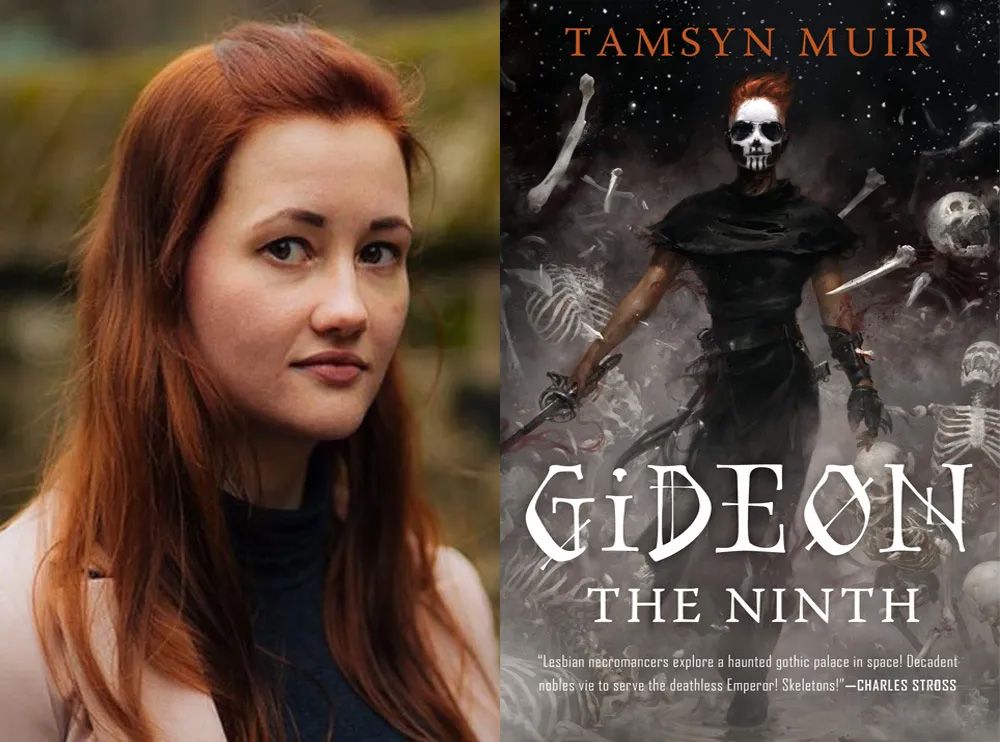Book Review: Gideon the Ninth
Gideon was so good that it threw me into a book coma and has made me question my skills as an author, and I mean those in the best possible ways.

A friend once introduced me to the idea of a "book coma," where a story is so unbelievably good that anything you read for a period of time after will seem terrible, because all you can think about is that one book.
Gideon the Ninth is the first book in forever that has plunged me into a deep, deep coma—so deep that I sincerely wonder if I might ever wake.
Let's break down how this seemingly innocuous necromancer story broke me so badly.
First: the characters. "Catty lesbian necromancers" would be a good headline, but it hardly does the characters justice. The protagonist, Gideon, is as snarky and rebellious as they come. While I would normally roll my eyes at this overdone trope, Muir backs it with snappy humor and turns of phrase that had me laughing so loudly in the dermatologist's waiting room that I had to put the book down. I couldn't get enough of Gideon. Her counterpart, Harrowhark, is every bit as nasty as Gideon is snarky. Together they form an odd couple who make Bert and Ernie seem like identical twins, and that chemistry works so well that it should be patented.
A cast of other interesting characters support the show, adding flavor, background, and yet more reasons for Gideon and Harrow to continue to be at each other's throats. Did I mention that most of them are also necromancers? Imagine how dysfunctional individuals must be who practice necromancy in the first place, and you're starting to get warm. Then strand these power-hungry oddballs in an isolated facility chocked full of dastardly secrets and just watch the bones fly!
WARNING: the cast is large. One of my very few gripes was being unable to track who belonged to what house. An online character reference like this would have been very handy, had I been able to stop reading long enough to search for one.
Second: the story. From Chapter 1 to Epilogue, Gideon hooked its carpals into my eye sockets and wouldn't let go. Muir kept me guessing right through to the end, teasing with provocative story questions, revealing just enough to keep me interested, and toying with my emotions so cruelly that I wonder if the author is herself a necromancer-in-training.
Gideon is a disgruntled miscreant in the Ninth House. Everyone hates her, and she hates everyone, which the entire, dying house seems to have long ago accepted. An unexpected invitation from the Emperor, however, sends her and Harrow to the mysterious First House, along with representatives from the other houses, where they have the opportunity to prove themselves worthy to be Lyctors: powerful necromancers from an era long past.
As you might imagine, the journey to Lyctorhood is fraught with mystery and peril that throw the necromancers and their cavaliers into a deadly game against their environment and each other. It was an emotional rollercoaster that I'm still recovering from.
Third: the writing style. This was the uppercut that knocked me flat. Muir has done what, at this point in my career, I feared no author could: make me seriously question my own writing ability. Every sentence is a masterpiece of phraseology. She combines words and expressions in ways that made me continually pick up my jaw like one of Harrow's shambling skeletons. It was beyond entertaining: Muir showed me a new way of writing.
I'm in the middle of editing one of my own books. One of my cardinal rules is that I don't read other books when I'm editing, because I find that my writing style changes to adapt the style of what I'm reading. In the case of Gideon, I intentionally read chapters between editing sessions, then put what I learned to use in my own book. The result may be a mash of styles, but I'm going to do another pass to smooth it out.
Make no mistake: I have a long, long way to go to approach Muir's level genius, assuming I'm even capable, but for the first time in years, I'm inspired to put aside my own established writing style and try to become something better.
Do I recommend this book? After the lavish praise I piled on above, the surprising answer is "maybe." IMHO, Gideon is, despite chronic use of passive voice, a literary masterpiece, but it's also about necromancers, and pulls very few punches in the gore category. If you're a casual reader looking for another happily-ever-after, Gideon might not be for you.
But if you have a cast-iron stomach and are coma-ready, then to that I say, "read on." Be warned, however, that you may never look at other books the same again. I certainly won't.
